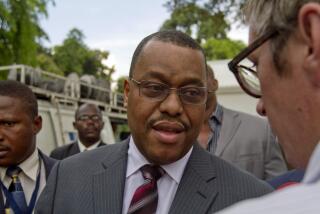A Team Effort for Haiti
- Share via
The United States is once again in the nation-building business in Haiti. With former President Jean-Bertrand Aristide’s exile to the Central African Republic -- some critics of the White House said Aristide claimed he was kidnapped -- the United States could not shrug its shoulders at the chaos 700 miles from its shores.
President Bush, who disdained nation-building when running in 2000, had sent mixed messages on his support for Aristide, who originally was backed by the United States, elected in 1990, ousted in a coup and then restored to power by the Clinton administration in 1994. Certainly, Aristide was a huge disappointment; human rights groups said he had ruled by intimidation, cronyism and violence, allegedly having political enemies murdered. Opponents accuse him of corruption, including pocketing drug money. Tremendous hope and faith were placed in him by his people, and he failed them.
That said, it’s unclear that the tiny, impoverished nation will be better off in the short term. Now that Aristide is gone, every effort should be made to help those left in the nominally in-charge Haitian government. That help has to come from the naturally interested and most powerful parties -- the United States, which occupied Haiti militarily from 1915 to 1934; France, its former colonizer; and Canada, plus the United Nations, the group of Caribbean countries known as Caricom, and the Organization of American States. First, they should support Boniface Alexandre, Haiti’s chief justice, now acting president pending a presidential election. The White House is following a Caricom recommendation that would place a council of Haitian “wise men” in charge of arranging new elections.
The divisions and fragmentations within Haitian society demand that a variety of political voices in Haiti -- with the exception of terrorizing thugs -- participate in the debate on the future the country.
The U.N. Security Council has rightly decided to send a U.S.-led multinational force to restore order.
Aristide is the seventh leader in the Western Hemisphere forced to leave power by popular demand since 1997. Last year it was Bolivian President Gonzalo Sanchez de Lozada, and before him Abdala Bucaram in Ecuador, Raul Cubas in Paraguay, Jamil Mahuad of Ecuador, Alberto Fujimori in Peru and Fernando de la Rua in Argentina.
These ousted leaders all were charged with corruption and mismanagement in their respective countries. Some of them were indeed corrupt and inept. But as a rule, the U.S. government should not side with those who would kick out of office constitutionally elected presidents. The rest of the hemisphere is watching.
More to Read
Sign up for Essential California
The most important California stories and recommendations in your inbox every morning.
You may occasionally receive promotional content from the Los Angeles Times.













